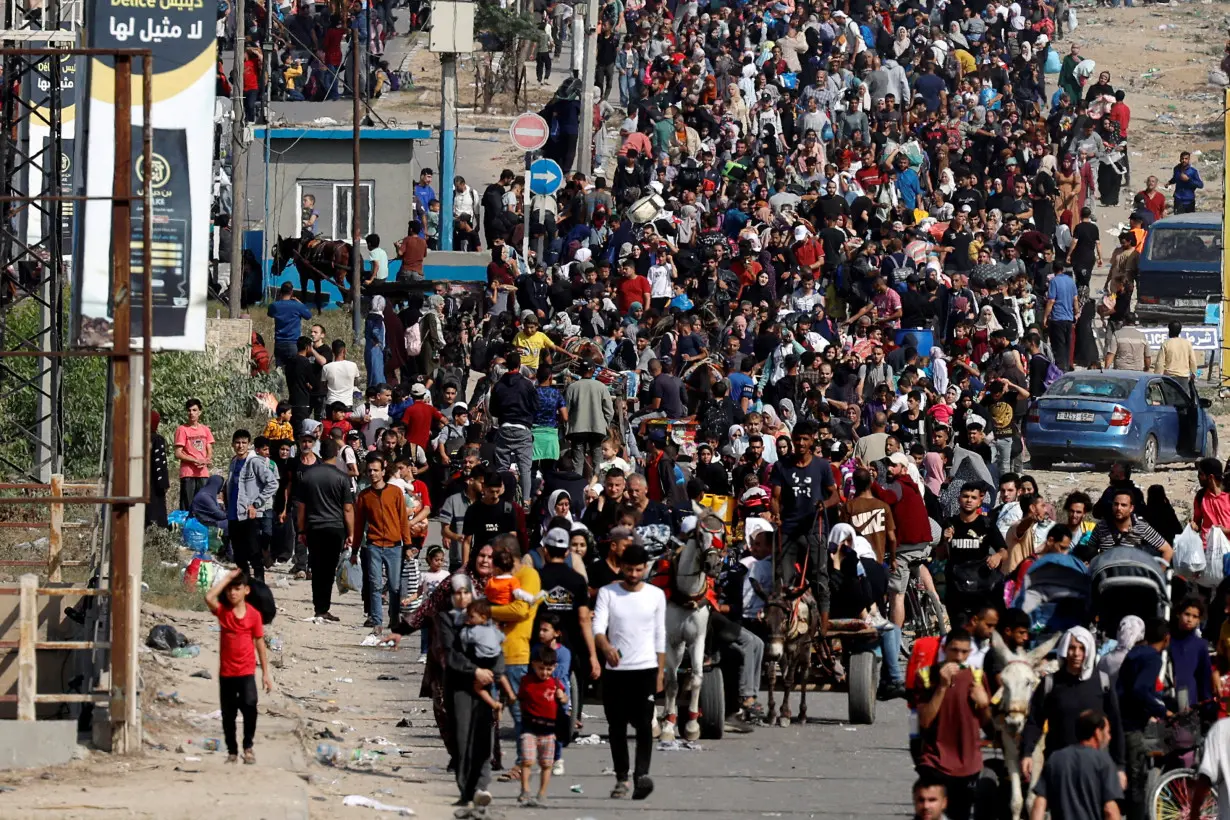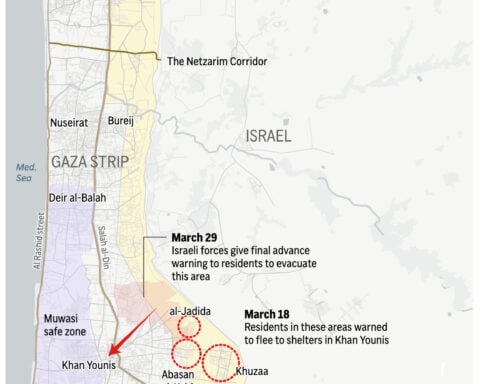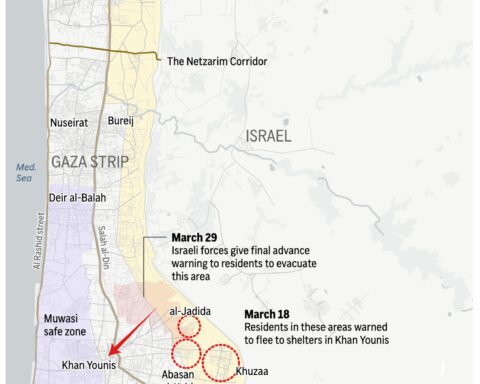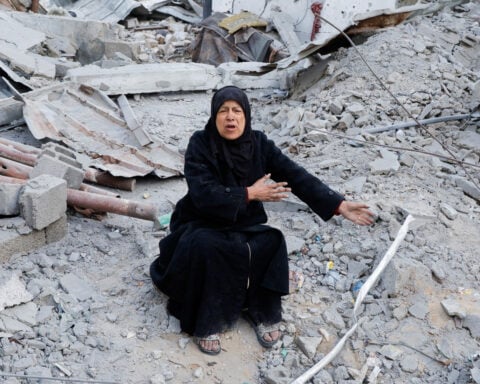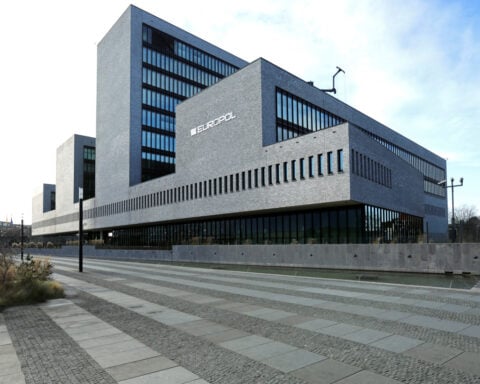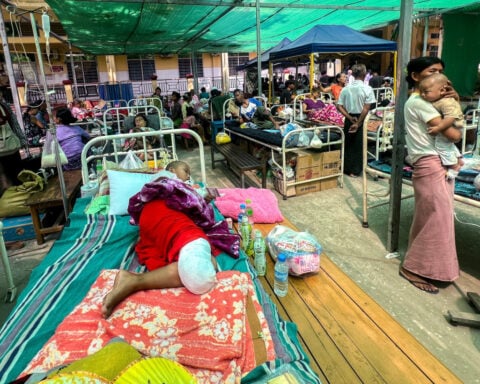By Bassam Masoud
KHAN YOUNIS, Gaza Strip (Reuters) - Fearful of being killed in an Israeli bombardment, families in Gaza were packing up and fleeing on Tuesday, heading for a pocket of land further south already crammed with displaced people without enough food, water or toilets.
Some were fleeing for the third or fourth time in less than two months.
Most of the Gaza Strip's 2.3 million people have been made homeless by the war between Israel and Hamas, and the new phase of displacement since a week-long truce ended on Dec. 1 is worsening an already catastrophic humanitarian situation.
In Khan Younis in southern Gaza, where Israel was launching a long-awaited assault, Palestinians who had sought protection from air strikes by camping in the grounds of the city's Nasser Hospital were rolling up their tents and loading cars or donkey carts with piles of mats and blankets.
"We are getting ready to leave Khan Younis, heading to Rafah. We have been here for about 50 days," said Abu Omar, a middle-aged man who left his home in the eastern part of the city and had been sheltering at the hospital camp with his family.
Rafah, further south on the border with Egypt, is one of the last remaining areas where the Israeli military has said civilians could go to escape the fighting, although it has been hit by many air strikes.
"There is no safe place ... but at the end, we head to wherever we think there might be a bit of safety," said Abu Omar, standing by a car whose roof was piled high with possessions.
But in Rafah, displaced people said their living conditions were horrible.
"There are no bathrooms. We cannot even wash if we want to pray. There is no place for us to wash or pray. If we want to wash our kids’ hands there is no place for that. There is not even a place where you can bake or get bread," said Enas Mosleh, sitting with her children in a shelter made out of wooden slats and transparent plastic sheets.
"We spend all night hearing rockets and bombing. We are living between life and death. We may die at any moment," she said, her face streaked with tears.
OVERCROWDING
Khan Younis was home to 381,000 people before the war. Another 245,000 people displaced by Israel's bombardment of the northern part of Gaza have been sheltering there, in 71 different locations, a United Nations spokesperson said.
The Israeli army has called for residents to evacuate to three designated areas in the Rafah governorate. Those areas are already packed with 280,000 residents and 470,000 displaced people who arrived after the war started on Oct. 7.
"The relocation directive would effectively bring the number of people in Rafah to 1.35 million, driving an additional 600,000 people from Khan Younis to an area with an existing population of 750,000 where the ability of the U.N. and partners to provide assistance is already critically challenged," the U.N. spokesperson said.
Hamas militants stormed into southern Israel on Oct. 7, killing 1,200 people and kidnapping 240 hostages, according to Israel's tally.
More than 15,800 Palestinians have been killed by Israel's military response in Gaza, according to figures from Gaza health officials deemed reliable by the United Nations.
Hassan al-Basiouny's home was in Beit Hanoun, a town in northeastern Gaza where 52,000 people used to live but was so heavily bombarded that there is barely an inhabitable building still standing.
He said he and his family first moved to a shelter elsewhere in northern Gaza, then to the Nasser Hospital camp in Khan Younis, and now they were going to Rafah -- their third displacement in less than two months.
"Safety can only be provided by God. Whatever God has willed will happen," he said.
(Additional reporting by Fadi Shana and Saleh Salem in Rafah and Maggie Fick in Beirut; Writing by Estelle Shirbon; Editing by Timothy Heritage)

 Trump has begun another trade war. Here's a timeline of how we got here
Trump has begun another trade war. Here's a timeline of how we got here
 Canada's leader laments lost friendship with US in town that sheltered stranded Americans after 9/11
Canada's leader laments lost friendship with US in town that sheltered stranded Americans after 9/11
 Chinese EV giant BYD's fourth-quarter profit leaps 73%
Chinese EV giant BYD's fourth-quarter profit leaps 73%
 You're an American in another land? Prepare to talk about the why and how of Trump 2.0
You're an American in another land? Prepare to talk about the why and how of Trump 2.0
 Chalk talk: Star power, top teams and No. 5 seeds headline the women's March Madness Sweet 16
Chalk talk: Star power, top teams and No. 5 seeds headline the women's March Madness Sweet 16
 Purdue returns to Sweet 16 with 76-62 win over McNeese in March Madness
Purdue returns to Sweet 16 with 76-62 win over McNeese in March Madness
